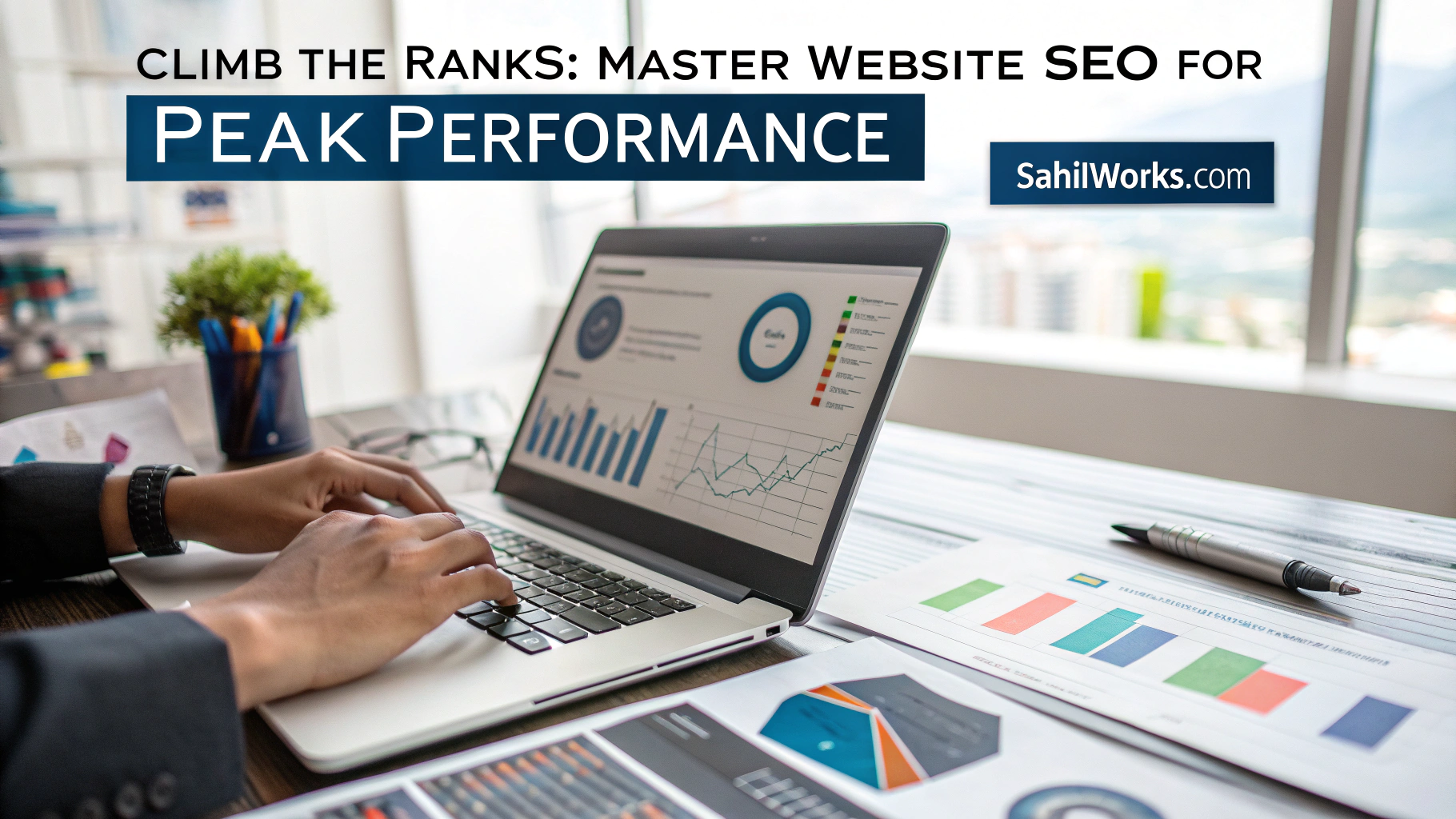Climb the Ranks: Master Website SEO for Peak Performance
Did you know that 68% of online experiences begin with a search engine, yet only 0.63% of Google searchers click on results from the second page? This staggering reality highlights why mastering Website SEO isn’t just an option—it’s essential for survival in today’s digital landscape. Whether you’re a small business owner or managing a corporate site, your ability to Rank Higher, Google Search results determines whether potential customers find you or your competitors.
Why It Matters

Rank Higher, Google Search,Website SEO
The impact of effective Website SEO extends far beyond mere visibility. According to recent studies, the first five organic results on Google account for 67.6% of all clicks. This translates directly to business outcomes:
- Websites ranking #1 on Google enjoy a click-through rate of approximately 31.7%
- Conversion rates are 10x higher for search traffic compared to social media traffic
- 51% of all website traffic comes from organic search
- SEO leads have a 14.6% close rate, compared to just 1.7% for outbound leads
In a digital ecosystem where attention is currency, proper search optimization isn’t just marketing—it’s a business imperative that directly impacts your bottom line.
Core Concepts
Understanding Website SEO requires familiarity with three fundamental pillars:
- Technical SEO: Think of this as your website’s foundation. Like a house with structural issues, no amount of decoration will compensate for technical problems. This includes site speed, mobile-friendliness, indexability, and secure connections.
- On-Page SEO: These are the visible elements that signal relevance to search engines. Consider keywords as the language you use to communicate with Google—they need to be placed strategically in titles, headings, content, URLs, and meta descriptions.
- Off-Page SEO: This represents your site’s reputation and relationships. Similar to how personal recommendations influence trust, backlinks from authoritative sites tell search engines your content is valuable and worthy of high rankings.
A successful SEO strategy balances all three elements, creating a comprehensive approach that resonates with both search algorithms and human visitors.
Strategy Implementation Guide
Step 1: Conduct a Thorough SEO Audit
Begin with a comprehensive analysis of your current position. Use tools like Semrush, Ahrefs, or Google Search Console to identify:
- Technical issues impacting crawlability
- Content gaps and opportunities
- Backlink profile strengths and weaknesses
- Competitor performance metrics
This baseline establishes clear priorities and reveals your most significant opportunities for improvement.
Step 2: Optimize Technical Foundation
Ensure your website meets current technical standards:
- Implement a secure HTTPS connection
- Optimize page load speed (aim for under 3 seconds)
- Create a logical site structure with clear navigation
- Ensure mobile responsiveness across all devices
- Submit an updated XML sitemap to search engines
Step 3: Master Keyword Research and Content Optimization

Effective keyword research transforms educated guesses into data-driven decisions:
- Identify high-intent keywords with manageable competition
- Analyze search intent behind target phrases
- Create content clusters around primary topics
- Optimize on-page elements (title tags, meta descriptions, headings)
- Develop comprehensive content that satisfies user queries
Remember that modern SEO requires covering topics comprehensively, not just including exact-match keywords.
Step 4: Build Authority Through Quality Backlinks
Implement strategic link-building campaigns:
- Create linkable assets (research, infographics, tools)
- Engage in guest posting on industry publications
- Reclaim unlinked brand mentions
- Utilize HARO (Help a Reporter Out) for media opportunities
- Conduct competitor backlink analysis to identify opportunities
Quality outweighs quantity—a single backlink from an authoritative domain can outperform dozens from low-quality sites.
Benefits
Successfully implementing Website SEO strategies delivers measurable advantages:
- Sustainable Traffic Growth: Unlike paid advertising that stops when spending ends, SEO creates lasting visibility
- Enhanced User Experience: SEO best practices align with user preferences, improving satisfaction metrics
- Higher Conversion Rates: Targeted organic traffic typically converts better than other channels
- Increased Brand Credibility: Top rankings create perception of industry leadership
- Competitive Advantage: Effective SEO creates barriers to entry that competitors must overcome
- Cost Efficiency: Long-term ROI from SEO typically exceeds other digital marketing channels
Case Study
A mid-sized e-commerce retailer specializing in sustainable home products implemented a comprehensive Website SEO strategy with dramatic results:
- Organic traffic increased by 143% within 6 months
- Conversion rate improved from 1.8% to 3.2%
- Average time on site extended by 1:45 minutes
- Bounce rate decreased by 24%
- E-commerce revenue from organic search grew by 167%
The key to their success was addressing all three SEO pillars simultaneously—fixing technical issues, developing comprehensive content, and building authoritative backlinks.
Tools & Resources
Leverage these industry-leading tools to accelerate your SEO success:
- Google Search Console: Free insights into search performance and technical issues
- Semrush/Ahrefs: Comprehensive SEO suites for keyword research and competitor analysis
- Screaming Frog: Technical SEO crawling and auditing
- PageSpeed Insights: Performance optimization from Google
- Surfer SEO: On-page optimization and content creation guidance
- HARO: Media outreach for authoritative backlinks
Common Mistakes to Avoid
Steer clear of these pitfalls that undermine Rank Higher, Google Search efforts:
- Ignoring Mobile Experience: 60% of searches now occur on mobile devices
- Prioritizing Quantity Over Quality: Thin content dilutes overall site authority
- Neglecting Technical Fundamentals: No amount of content compensates for poor technical SEO
- Over-Optimizing Keywords: Modern algorithms penalize unnatural keyword stuffing
- Ignoring User Intent: Rankings without satisfaction lead to high bounce rates and ranking penalties
- Neglecting Analytics: Without measurement, optimization becomes guesswork
Future Trends
The SEO landscape continues evolving with several emerging trends:
- AI-Generated Content Evaluation: Google’s helpful content update increasingly scrutinizes quality and authenticity
- Core Web Vitals Expansion: User experience metrics becoming more influential in rankings
- Voice Search Optimization: Conversational queries requiring different optimization approaches
- Entity-Based SEO: Moving beyond keywords to understanding conceptual relationships
- E-E-A-T Focus: Expertise, Experience, Authoritativeness, and Trustworthiness as primary ranking factors
Conclusion
Mastering Website SEO requires dedication to technical excellence, content quality, and relationship building. The difference between appearing on page one versus page two of search results can represent thousands of potential customers and significant revenue opportunities. By implementing a comprehensive SEO strategy that addresses all three pillars, you position your business for sustainable growth and competitive advantage.
Start by conducting a thorough audit of your current position, then methodically implement improvements across technical, on-page, and off-page factors. Remember that SEO is a marathon, not a sprint—consistent effort yields compounding returns over time.
FAQs
How long does it take to see results from SEO efforts?
While some improvements can appear within weeks, significant ranking changes typically take 3-6 months depending on competition, site history, and implementation quality.
Is it better to focus on technical SEO or content creation first?
Critical technical issues should be addressed first, as they can prevent content from being properly indexed. Once the foundation is solid, content development becomes the priority.
How many keywords should I target on each page?
Focus on one primary keyword and 2-3 related secondary keywords per page. Modern SEO is more about comprehensive topic coverage than keyword density.
Do social media signals directly impact SEO rankings?
While not direct ranking factors, social signals can amplify content visibility, increase backlink opportunities, and improve brand awareness—all contributing to SEO success.
Is hiring an SEO professional worth the investment?
For businesses without specialized in-house expertise, professional SEO consultation often delivers positive ROI through improved rankings, traffic, and conversions that would be difficult to achieve independently.

